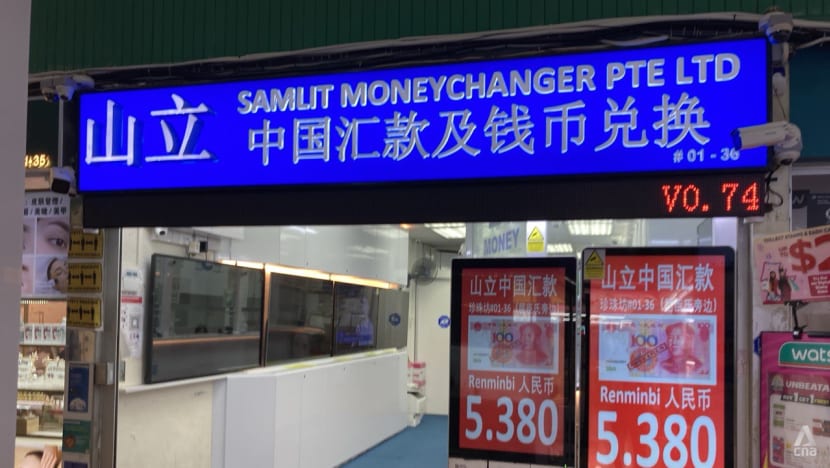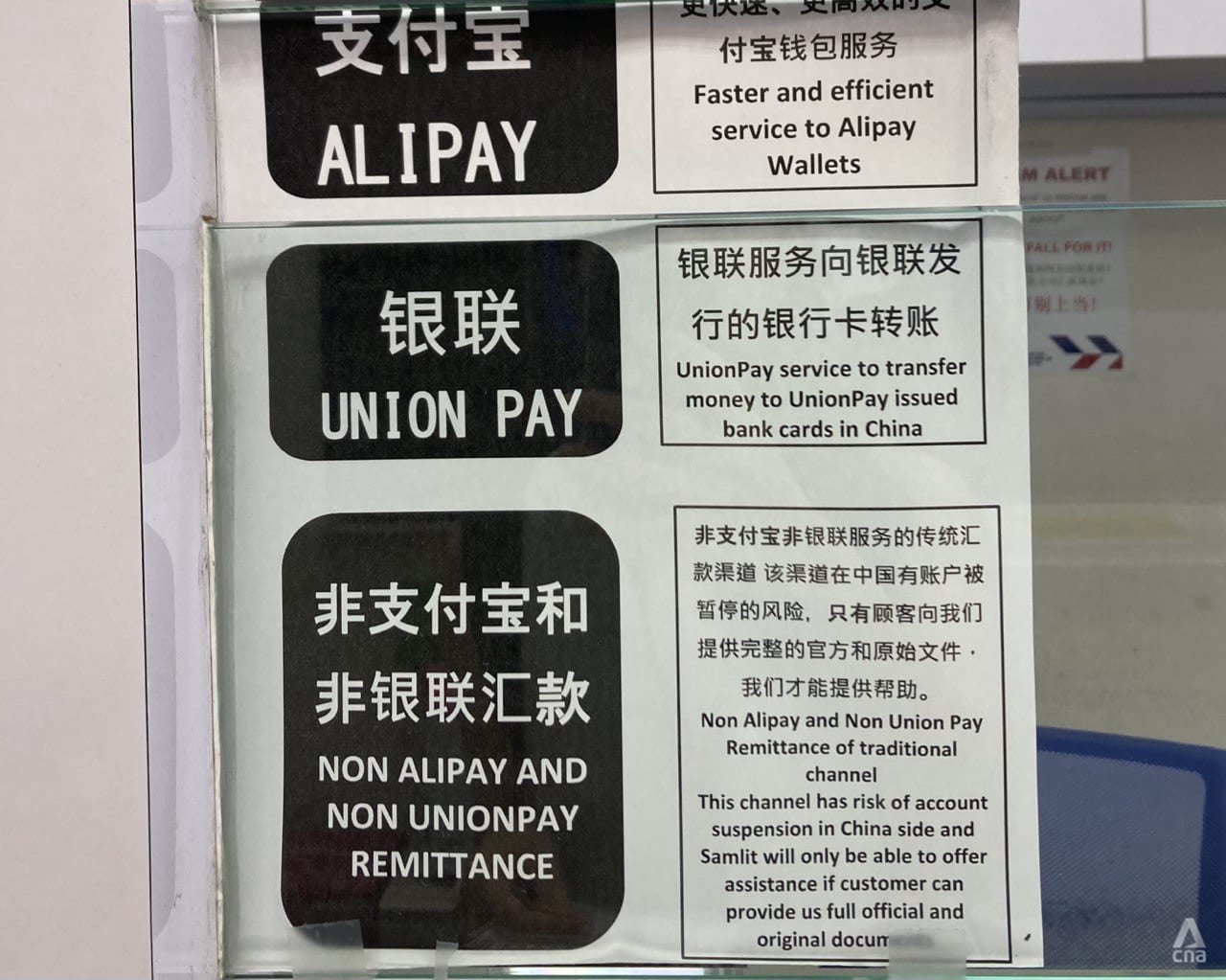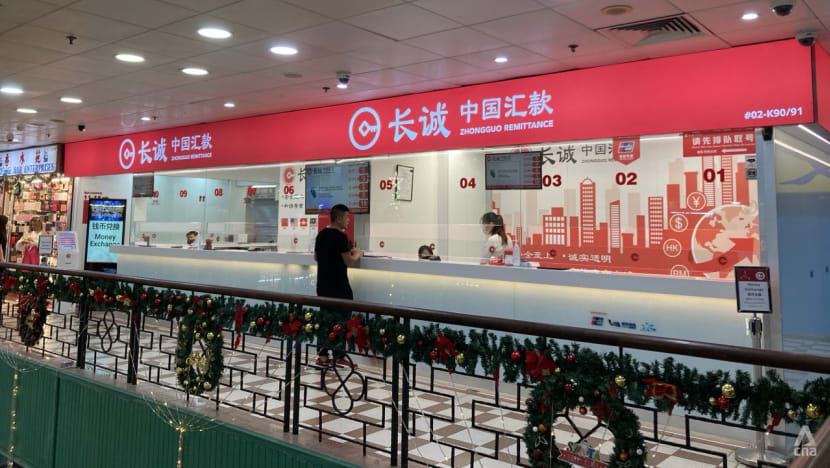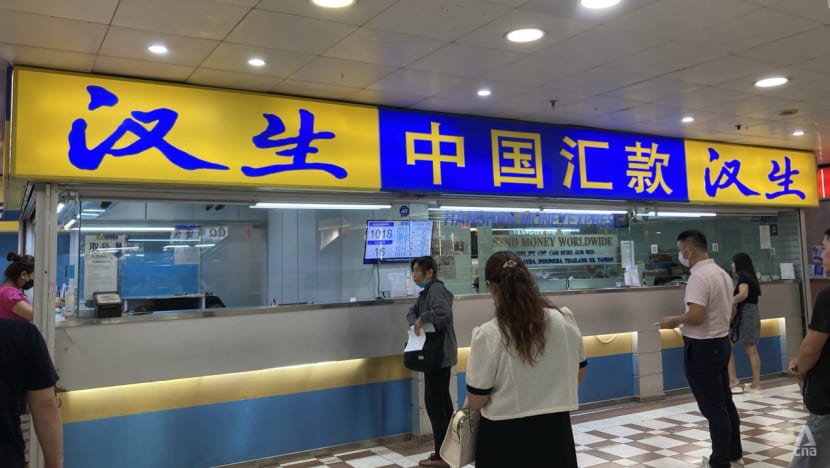
SINGAPORE: Sushi chef Li Chang Jiang sent thousands of dollars to his daughter in China seven months ago using Samlit Moneychanger's services.
Four days later, her account was frozen.
He and his family still have no access to that money - around S$21,000 (US$15,800) - which is about six months of his salary.
“We’re waiting for the Singapore government and Chinese government to help us resolve this problem quickly. We need the money,” Mr Li told reporters in Mandarin.
“Every cent we earn in Singapore is made through hard work. We hope that the government will pay attention to this problem."
Mr Li is not alone.
According to the Singapore Police Force, it received more than 670 reports of remittances being frozen by Chinese authorities, with around S$13 million in funds affected.
The issue has prompted the Monetary Authority of Singapore (MAS) to instruct remittance companies to suspend money transfers to China through non-bank and non-card channels.
Remittance companies providing cross-border services to China must only engage a bank or a card network like Union Pay to assist in the money transfer.
"While customers may now have to pay more to remit funds to China, this suspension is necessary for the immediate protection of consumers, and to stem the number of reported new cases of beneficiaries’ accounts in China being frozen," MAS said on Monday (Dec 18).

About 430 of the police reports made were against Samlit Moneychanger.
Mr Sam Malik of Samlit Moneychanger told CNA that the company observed an uptick in cases in October, but cannot pinpoint exactly when the accounts were frozen.
Referring to the MAS decision to suspend non-bank and non-card transfers, he said: “We strongly believe the move will be welcomed by customers and our industry peers in the current situation.”
"SAFETY FIRST"
Mr Li, the sushi chef, now sends money to China using DBS instead of choosing overseas third-party agents through remittance companies.
“The money reaches my family in a few minutes, and it’s safe. The exchange rate isn’t as good, but safety first,” he said. “I don’t need to worry about my account being frozen.”
“There are 600, 700 of us waiting for good news. I hope we can be compensated quickly and our families will be able to use the money. That’s what we want,” he added.
While speaking to reporters, Mr Li paused to tell another Chinese national, construction worker Xing Yu Zhu, that he should also use official banking channels.
Mr Xing said he had not decided whether to use a bank or a different remittance company and said he feels that whatever he chooses, there will still be a risk of running into trouble.
He has been a customer of Samlit Moneychanger for around 10 years and his account in China was frozen a few months ago.
He showed CNA messages on WeChat that detailed how his money was sent over to China in three batches.
The first two were unaffected, but the last tranche of money – around 12,000 yuan (S$2,200) - was frozen. Mr Xing said he believes he is a victim of a scam because his family was asked to pay a ransom of 500,000 Chinese yuan (S$94,000) for the account to be unfrozen.
MAS said on Monday that it is unclear why these funds had been frozen.
Mr Xing chose Samlit because it offered a better exchange rate.
“The safer ones have a bad exchange rate,” he said. “It could be a few hundred dollars’ difference.”
He said he drops by Samlit nearly every week to ask for updates.
“I’m thinking of going back to China to settle this issue,” he said. “It doesn’t feel good. I earned my money honestly, but it’s frozen in an account.”
Samlit's Mr Malik said the company assesses documents provided by their customers who face issues. It then determines if the customer suffered "financial inconvenience" due to the transaction processed by the company and looks for a resolution based on Singapore’s laws.
SUPPORTING CUSTOMERS
Two other remittance companies named by MAS and the police were involved in a meeting on Monday evening with 39 people whose accounts were frozen.
Mr Jed Huang, chief executive officer of Zhongguo Remittance, said the meeting went well and affected customers had the chance to ask questions.
“The central part of it is to assist the customers in getting the relevant documentation and to consider how we can help the customer to get their accounts unfrozen. All of them, their funds are from legitimate sources,” he said.

He added that MAS’ message was that the customers should be treated fairly. That means the remittance companies should look out for their interests and try to eliminate or reduce the risks they face.
The company has made “monetary restitution” in cases where there was proof of two things - that the funds were affected because of a Zhongguo Remittance transaction, and that there was an official deduction by authorities.
Mr Huang said Zhongguo Remittance typically encourages customers to send their funds via Union Pay, which is less risky. He estimates that around 40 per cent of his customers use Union Pay or similar products.
The number of people whose accounts were frozen in China make up about 1 per cent of the company's customers, and all of them chose to transfer money through overseas third-party agents.
They may choose to do so because of better rates or because Union Pay is not able to reach the Chinese bank that they are using. They are required to sign a form acknowledging the risks involved.
Even though overseas third-party agents are still conducting transactions from Singapore for now, as the MAS restriction kicks in on Jan 1, Mr Huang said the situation appears to have improved after peaking in October. The number of frozen accounts first started to increase around June.
Zhongguo Remittance said it is working with MAS and their partners in other jurisdictions.
“I think to date they have done a good job because the number of complaints has fallen in the past two months,” he said.
But Mr Wong, a customer of Hanshan Money Express whose account remains frozen, said he feels caught in the middle since Singapore and China each have different regulations.
“I’ve been remitting money for 18 years, I trusted the system,” said the 49-year-old who works as a driver. “This is the first time I’m facing a problem.”

In Mr Wong's case, he is less worried about the frozen funds. His main concern is the inconvenience because besides his bank account, his social and health insurance accounts – similar to Singapore’s Central Provident Fund and Medishield – are also frozen.
Mr Wong is also concerned he would get blacklisted and that it would affect his child’s education.
“We work hard to earn money in Singapore for the future of our children. The rest of their lives are at stake,” he said.
“We feel quite powerless in this situation.”
CNA has contacted Hanshan Money Express for comment.
https://www.channelnewsasia.com/sin...-accounts-singapore-chinese-nationals-3999196



